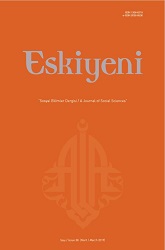Doktrin ve Olgu Bağlamında Küçüklerin Evlendirilmesi
The Marriage of Minors in the Context of Doctrin and Case
Author(s): Ahmet YamanSubject(s): Civil Law, Islam studies, Family and social welfare
Published by: Anadolu İlahiyat Akademisi
Keywords: Islamic Law; Marriage of Minors; Marriage; Fiqh; Fact; Doctrine of Fiqh;
Summary/Abstract: The word “minor” is used in various meanings in different legal systems and social traditions. Minor or child is defined sometimes according to age, sometimes according to adolescence (puberty) and sometimes to maturity (rushd) and sometimes according to subject or the crime committed. In fact, it can be witnessed that even within the same legal system, there is no definition of a minor or child valid in all areas of law. For example, while the Turkish Civil Code does not mention a certain age range in determining minority, the Turkish Penal Code and the Child Protection Law describe the child as the person who has not yet completed the age of eighteen. In the Law on the Establishment,the Rules of Procedure and Trials of the Children's Courts, minority is defined in terms of some actions as 12 years old, and in terms of some actions up to15 years old. As it is understood from this information, the definition of minor or child varies according to culture, society and subject.When fiqh literature is concerned, minority / childhood very clearly refers to prepuberty/ pre-bulla period. The validity, legal capacity, custody of the legal savings of a child during this period and the issues of custody on the property of the child are also discussed in detail. One of these issues is also his/her marriage.The classical tradition of jurisprudence in general acknowledge it legitimate that minors can be married by their parents. In addition to some indirect expressions of the Qur'an by those who accept this, clear determinations in the Sunna and many applications in the period of the Companions are evidence of this legitimacy.However, in the context of the classical view, the following important detail should be pointed out: The marriage of minors and the actual sexual intercourse with them after the marriage are evaluated separately. The permissibility of sexual intercourse depends on their ability to tolerate this in their physical development. The guardian of the minor has the right to block it.In the times when classical fuqahas had these views, basically, the same approach was generally accepted in both the eastern and western non-Muslim societies.Nonetheless, some of mujtahids -who remain few in numbers- in the classical period did not accept the afore-mentioned practice because they did not find it compatible with the requirements and benefits of the marriage institution.This opinion was adopted in the 1917 Law and Family Decree which came into force in the last period of the Ottoman Empire. This view is also dominant among today's fuqaha.This article examines this issue through the evidence and approaches of the parties. The conclusion of the author in a cool-headed analysis is this:Marriage of minors is a subject closely related to the social phenomenon, conjectural requirements and social reality. Religious texts (nass) or first period practices which directly or indirectly allow this should also be explained by this fact and necessity. There may be situations in which time and geography are experienced and this practice can be considered as legitimate. But, as of today,there is no factual background that will legitimize this practice.
Journal: Eskiyeni
- Issue Year: 2019
- Issue No: 38
- Page Range: 9-29
- Page Count: 21
- Language: Turkish

